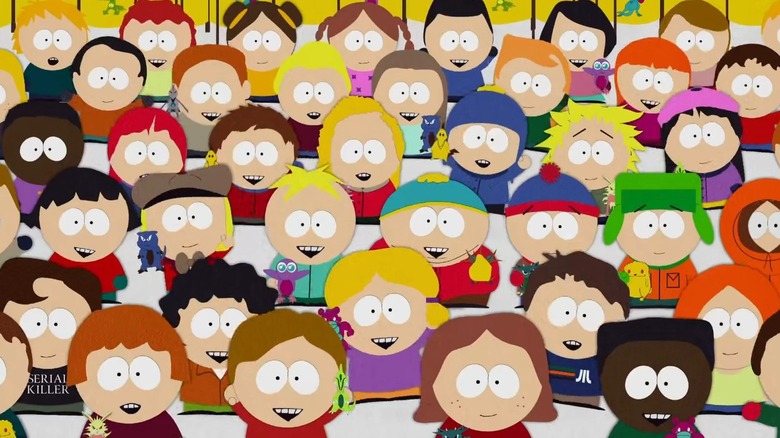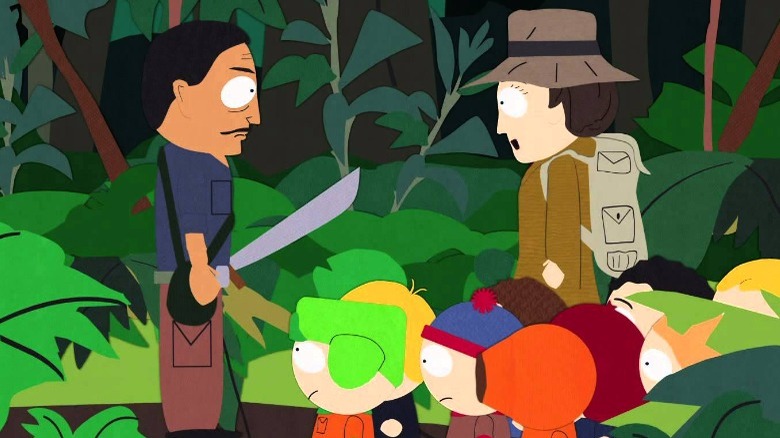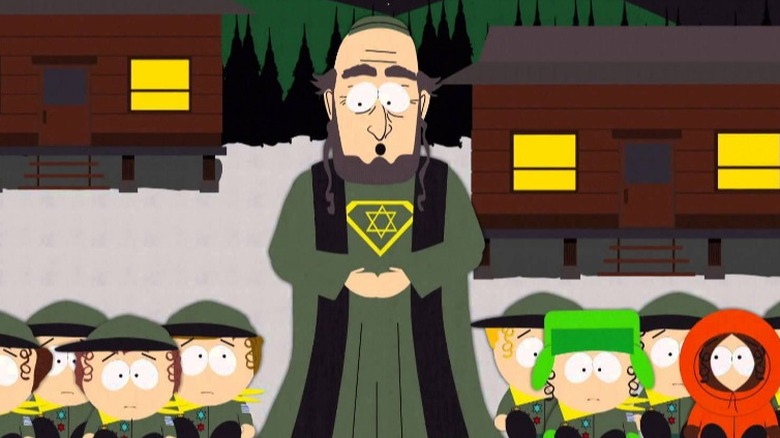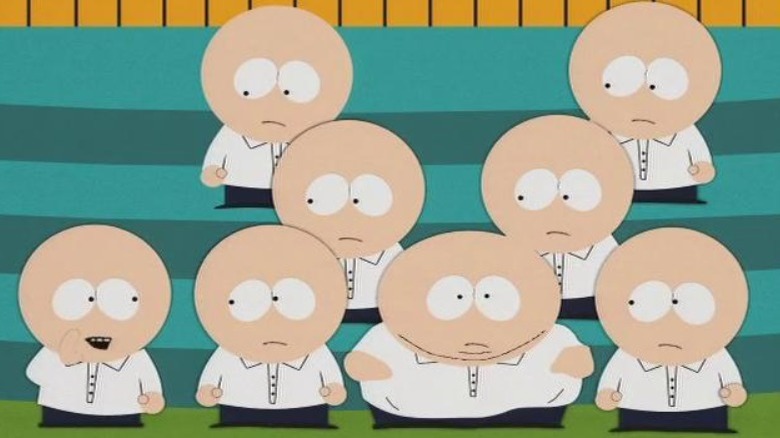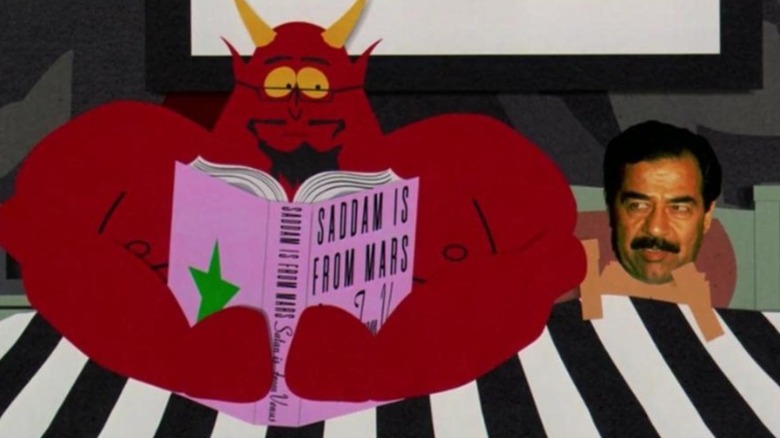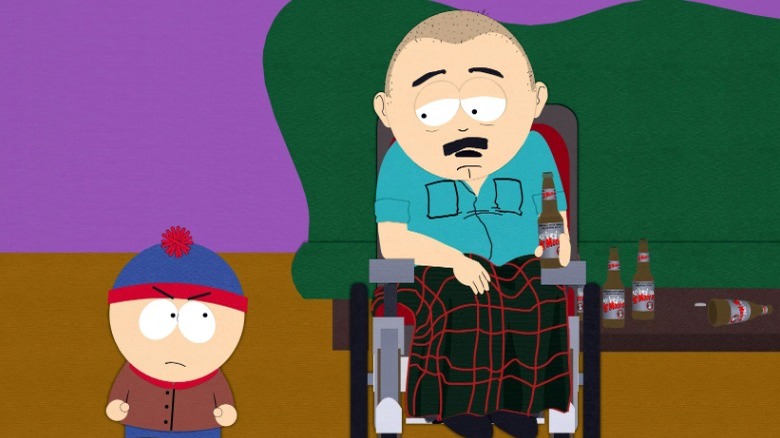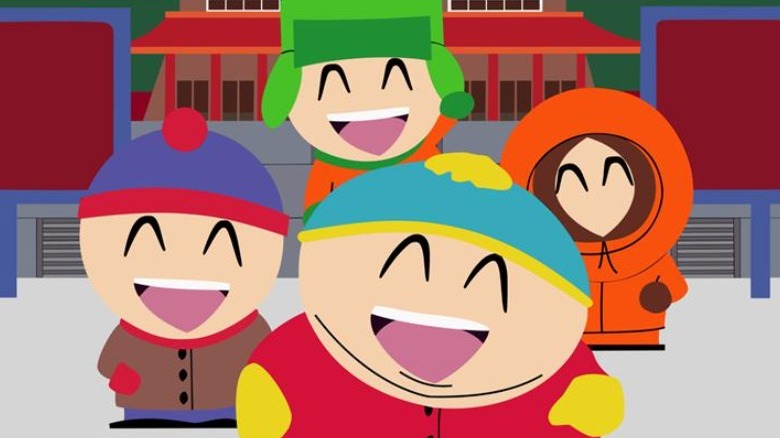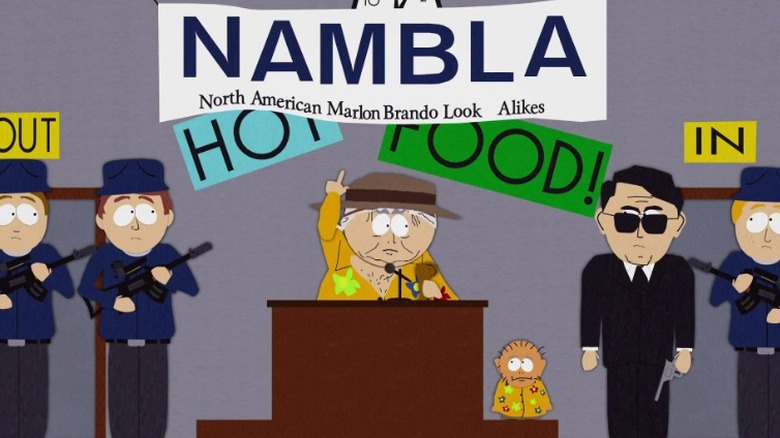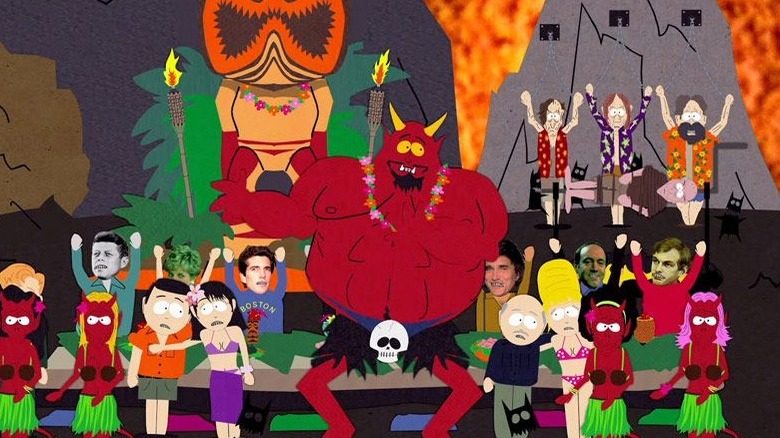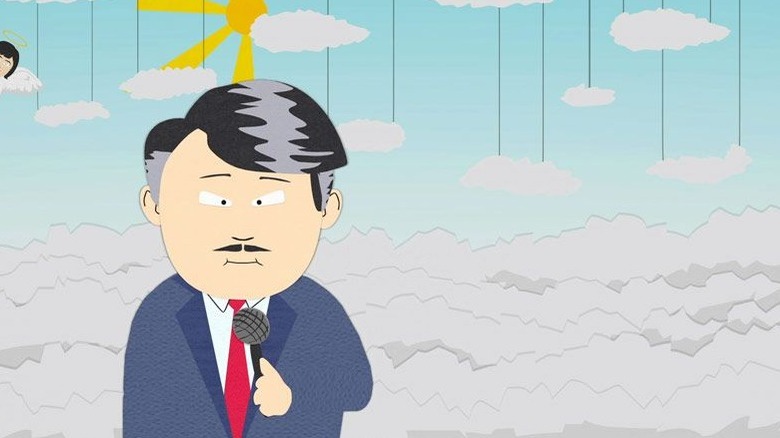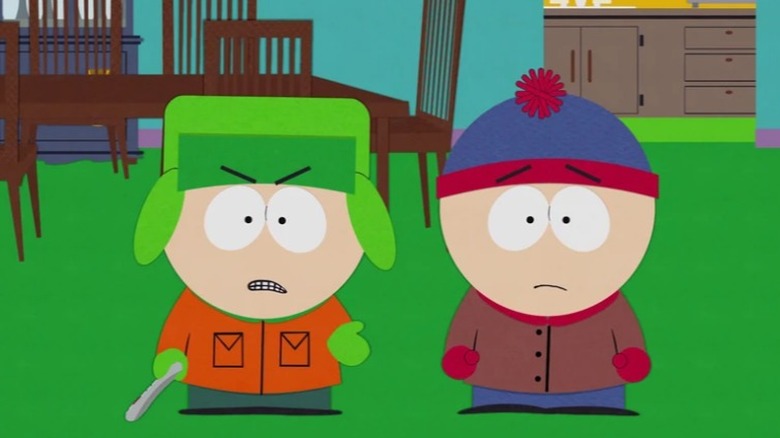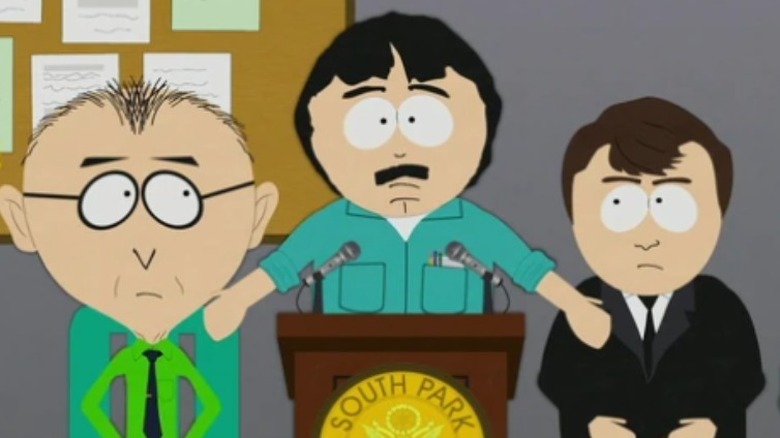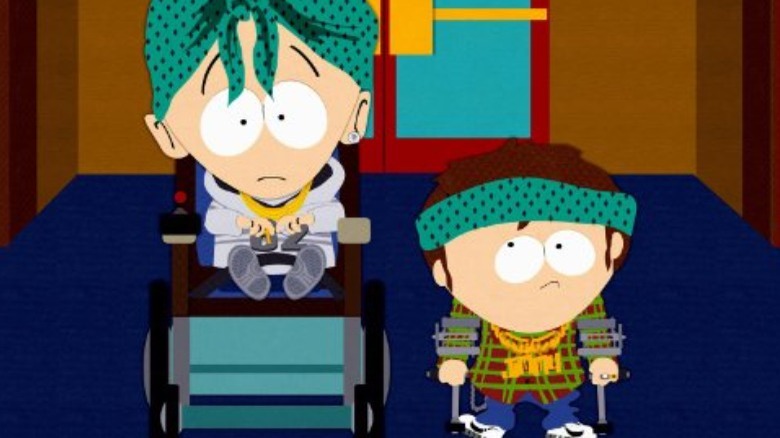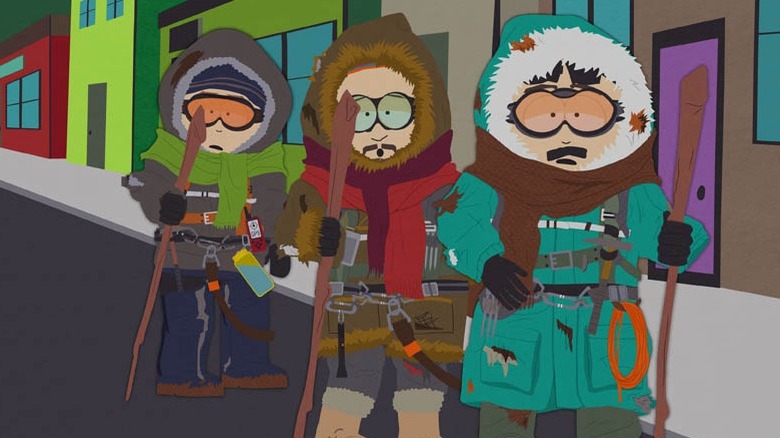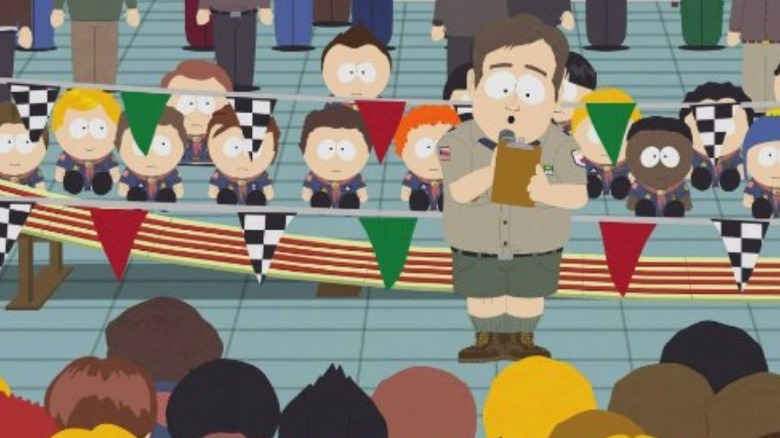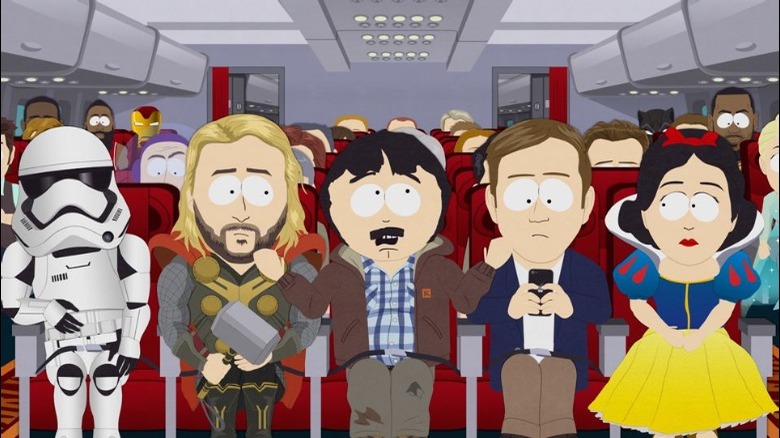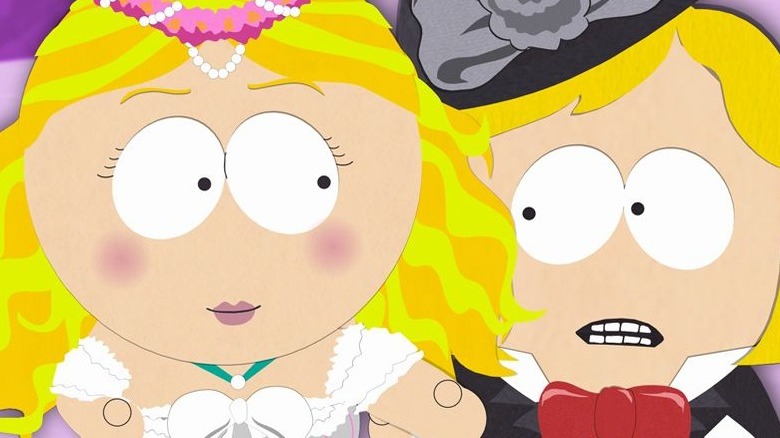The 18 South Park Episodes That Got Banned (& One That Should Be)
When viewers first tuned into "South Park" in 1997, there had never been anything quite like it on television. Visually inspired by the paper cutouts used in "Monty Python's Flying Circus" and heavily influenced by the work of Mike Judge and Matt Groening, Trey Parker and Matt Stone's profanity-laden series has now spent nearly three decades exploring every corner of the zeitgeist through the eyes of four elementary school-aged kids. Whether the show is delving into global warming, celebrity worship, or the pitfalls of organized religion, friends Stan, Kyle, Cartman, and Kenny frequently find themselves caught between extreme points of view only to realize the best approach is a more nuanced one.
But not everyone loves the show's confrontational approach to topical issues, and in its decades on the air, "South Park" has ruffled more than a few feathers and even ended up on some networks' — and nations — no-fly lists. Hang onto your dreidel and don't forget to bring a towel as we take a look at every episode that got banned and one that probably should have been.
Rainforest Shmainforest
As Trey and Matt would express in their Season 3 audio commentary, the third season of "South Park" would be the first time they began to formulate the storytelling that fans would come to love about the series. The first episode in the show's first season, "Rainforest Shmainforest" was inspired by Parker's real-life experience in Costa Rica. Going on a recommendation from Flea of the Red Hot Chili Peppers, Trey and his girlfriend at the time booked a trip to the rainforest — probably a bad move considering Parker's hatred of snakes. In the "South Park" audio commentary, Parker described the country as "hot and dirty and smelly," expressing frustration with Flea for recommending the trip.
He came back and penned a less-than-flattering episode about the country that finds the South Park kids on a school trip to San José, Costa Rica. Seeing as the country is depicted as an impoverished nation overrun by insects, snakes, and revolutionaries, it's little wonder that it didn't go over well in Costa Rica, with Costa Rica's tourism minister Carlos Benavides calling it "trash" in 2007. In 2011, MTV Latin America decided to stop airing the offensive original episode, eventually releasing a censored version redubbed by StudioCenter in 2012.
Jewbilee
The finale episode of the three-part "Meteor Shower Trilogy," "Jewbilee" is one of Trey and Matt's favorites in the series. It was also the final of three episodes the creators still had to make after putting together the full-length film "South Park: Bigger, Longer, Uncut," and the pair had more than a touch of vacationitis during its production. Feeling pretty great about their work on the movie, they decided to make the episode as bonkers as possible and just get through it.
The episode revolves around Kyle's camping trip with the Jew Scouts on the night of a big meteor shower. Between Kenny's crash course in Judaism, the Squirt Scouts' merit badges, and the Tron-inspired vision of a macaroni picture-crazed Moses, the episode spends plenty of time goofing around with Jewish traditions. Likely owing to concerns about how it would be received in the country, the episode, which first aired in 1999, was not originally dubbed in Hungarian. It was finally released in Hungary on Cool TV in 2005, and around the same time, it became available for sale in that country. In Hungarian, the episode title translates to "Addicts of Religion."
Super Best Friends
In 2001, illusionist David Blaine was at peak popularity — making him a prime target for "South Park" parody. "Super Best Friends" stepped up to the challenge by imagining a world where Blaine heads up a very Scientology-inspired cult called Blaintology, using the art of illusion to lure in acolytes through his Magic Camp. Impressed by Blaine's magic, Kyle, Stan, Kenny, Cartman, and Butters sign up and quickly find themselves trapped in a dangerous cult. With everyone else completely brainwashed, it's up to Stan to save the day with the help of Jesus and his Super Best Friends — a Superfriends and Justice League-style sendup that comprises Jesus, Krishna, Buddha, Muhammad, Lao Tse, Moses, Joseph Smith, and the Aquaman-inspired Seaman.
A classic example of what makes "South Park" great, the episode is brimming with potentially offensive content from Buddha having a coke habit to the thinly veiled rebuke of Scientology. But it's the episode's depiction of Muhammad that would get it banned years after first airing amid a rise in threats from extremist Muslims. After one such extremist executed Dutch filmmaker Theo van Gogh in 2004, networks were far less inclined to risk airing images of Muhammad. South Park Studios removed the episode from its available content, and it's one of only a few episodes that can't be found on streaming video.
South Park: Bigger, Longer, & Uncut
Technically a full-length feature film, "Bigger, Longer, & Uncut" is an essential piece of the "South Park" canon. Released in 1999, the film finds the kids of South Park embroiled in a war between the United States and Canada as paramours Saddam Hussein and Satan hatch a plot for global domination. The film heavily explores the topic of censorship, something that was on Trey and Matt's mind as their series had at that point already been the target of ban attempts several times in its first two seasons. Unlike the show's other cartoonish figures, Saddam Hussein's character uses a photographic cutout of the real Hussein's head, which somehow seems even more insulting. The depiction of Hussein and Satan's homosexuality is just as savage, with Saddam painted as an abusive partner with Satan completely under his thumb.
Suffice it to say, the real Hussein did not find the joke remotely funny, and the film was banned in Iraq upon its release. After Hussein's arrest, Stone said he had it on good authority that Marines had forced the dictator to watch the film on repeat before his execution.
Bloody Mary
Since no religion is off-limits for "South Park," it was only a matter of time before the show's creators would put Catholicism in their crosshairs. And that's exactly what happened in the Season 9 episode "Bloody Mary," which finds Stan's perennially suggestible dad Randy Marsh transformed into a full-fledged hypochondriac after a stint in a 12-step program convinces him he's afflicted by a disease he has no control over. When rumors of a miraculous bleeding Virgin Mary Statue begin to circulate, Randy becomes convinced she holds the key to his cure.
The timing of the episode was somewhat unfortunate as it coincided with the Catholic holy day The Feast of the Immaculate Conception when it first aired on December 7, 2005. With its Papal parody and vaginally bleeding Mary statue, the episode sufficiently ired quite a few high-ranking Catholics, inspiring President of the US Bishops William Skylstad to pen an irate letter to Viacom. After the Catholic League for Religious and Civil Rights got involved, the episode was left out of the end-of-season reruns in the US. In Australia, Melbourne Archbishop Denis Hart's demand for the episode's censorship was initially met with dismissal, but its release was ultimately postponed until August 2006.
Chinpokomon
Just as the '90s Beanie Baby craze was fizzling out, the Pokémon explosion began taking over mall kiosks and playgrounds across America. Many a pearl-clutching fundie looked on in helpless horror as kids everywhere became hyper-obsessed with the Japanese pocket monsters, so it was only a matter of time before a reactionary tsunami of Satanic Panic rolled its way through the nation's pulpits. Groups like the ChildCare Action Project railed against the franchise for its violence, magic, mind control, and — gasp — seductively-drawn female characters, so of course the South Park kids had to get in on the fun in the 1999 episode "Chinpokomon."
In a clear parody of the adorable anime juggernaut, South Park's elementary school community is overtaken by Chinpokomon, a merchandise-driving Japanese animation replete with subliminal messages compelling kids to buy their products and attend Chinpokomon camp. The only catch? The camp is secretly a super-soldier brainwashing vehicle to train kids for a second attack on Pearl Harbor. Besides the obviously taboo kamikaze joke, the episode also seems to take aim at Emperor Hirohito Shōwa and relies on a running gag about Japanese and Caucasian private parts. Unsurprisingly, someone felt the episode wouldn't go over well with Japanese audiences, and it was ultimately cut from Japan's WOWOW network schedule and the Japanese DVD release.
Cartman Joins NAMBLA
Easily one of the most shocking episodes from the show's early seasons, "Cartman Joins NAMBLA" is one of a handful of "South Park" episodes conveniently left off the lineup by Italian free-to-air station Italia 1 during the show's original Italian syndication in 2003, with Italian fans waiting until 2006 before they got the chance to catch it. Although it's hard to pinpoint which offense tipped the scales against it, the episode is replete with gasp-worthy gags built around taboo subjects ranging from infanticide to pedophilia.
When Cartman sets out on a quest to obtain "more mature" friends, he turns to the Internet, where he immediately finds plenty of grown men eager to meet up with young boys. When his new "friends" keep getting arrested, Dr. Mephesto suggests he join NAMBLA (the North American Marlon Brando Look Alikes). There's some confusion when his plans intersect with another group of the same name – the pedophilia and pederasty group the North American Man-Boy Love Association. And then there's the episode's B-plot, which revolves around Kenny's extensive efforts to stop his parents from having another child through repeated attempts to induce an abortion. Both storylines are taken to fairly extreme conclusions, with one character ending up traumatically assaulted by the bad NAMBLA. It's a lot to stomach, and it's not hard to see why Italia 1 felt audiences weren't quite ready for it.
Do the Handicapped Go to Hell? and Probably
The two-part storyline "Do the Handicapped Go to Hell?" and "Probably" was among the handful of "South Park" episodes to get cut from Italia 1. The story serves as a follow-up to "Bigger, Longer, & Uncut" by revisiting Satan's twin flame relationship with Saddam Hussein. The trouble starts when Father Maxi frightens the bejeezus out of South Park's gentile population with a good old-fashioned hellfire-and-brimstone sermon. Scared straight, Cartman, Kenny, and Stan decide to get religious but soon begin to ask inconvenient questions – specifically, whether their Jewish and disabled friends will go to Hell for not confessing their sins.
Things go completely off the rails when the children become disillusioned after uncovering Maxi's hypocrisy, Cartman starts a fundamentalist cult, and Satan's love triangle with Saddam and Chris turns homicidal. Amid all of the story's twists and turns, it's also revealed that of all the world's religions, only Mormons get into the good place. While it's hard to say why Italia 1 left the two-parter off their playlist until 2006, the images of a priest having intercourse with a married woman and the deeply critical look at organized religion probably had something to do with the episodes getting the ax.
A Ladder to Heaven
"A Ladder to Heaven" revolves around Kyle, Cartman, and Stan's efforts to reach their late friend Kenny in heaven and the media frenzy that ensues when South Park's adults learn of their efforts. Unaware that the boys' act is not one of altruism but a misplaced attempt to get their hands on a winning all-you-can-grab candy prize ticket Kenny was hanging onto, the entire nation starts rooting for them and Alan Jackson even writes an emotional country song. As always happens in South Park, things escalate to the extreme when the whole thing turns into a space race with Japan, the U.S. government gets involved, Cartman gets possessed by consuming Kenny's ashes, and Saddam Hussein builds a WMD factory in heaven.
Originally produced only a year after 9/11, the episode takes aim at what Stone and Parker felt was a post-9/11 cash grab, with the creators specifically calling out Alan Jackson's overly saccharine 9/11 memorial song on their DVD commentary. Whether due to concerns over 9/11 sensitivity or general malaise over the appearance of US vs. Japan vs. Hussein brinkmanship remains unclear, but the episode would be one of a handful of "South Park" episodes not to air during the show's first run in Japan.
Cartoon Wars Part I and II
Although the depiction of Muhammad in "Super Best Friends" went largely unnoticed when it originally aired, by 2006, most media outlets and production studios were doing everything they could to avoid drawing the attention of an entire religion. As a network that typically didn't shy away from controversy, Comedy Central was still struggling to work out where "South Park" could draw a boundary with future depictions of the prophet when Trey and Matt decided to take a crack at the discourse in the two-episode story arc "Cartoon Wars."
Part analysis of the Muhammad controversy, part brutal savaging of "Family Guy," "Cartoon Wars" begins with a typical South Parkian panic over the news that the Seth MacFarlane series intends to show a depiction of Muhammad in an upcoming episode. MacFarlane took it better than expected, calling the episode "funny and accurate" in a Rolling Stone interview. But the episode's content left the network feeling squeamish, and the final episode included a title card explaining the scene rather than actually displaying an image of Muhammad. When HBO took over Comedy Central's catalog, they decided to completely dodge the issue by leaving the two-parter off the streaming app entirely along with three other controversial South Park episodes.
200 and 201
For the 200th episode of "South Park," Trey and Matt decided to pull out all the stops by bringing back every celebrity the show had ripped on over the years as well as another tease about a potential Muhammad appearance. United under Tom Cruise, all of their former targets arrive in South Park to file a class action lawsuit against its residents — but there's a catch. Believing Muhammad to be immune from mockery and ridicule, Tom Cruise and company concoct a deal: If the good people of South Park will hand the prophet over, they will agree to drop the lawsuit. As in "Cartoon Wars," the two-part storyline spent one episode teasing Muhammad's appearance, leaving fans to wonder if they would follow through in "201." And just like "Cartoon Wars," the episode that aired was a censored version of what Trey and Matt had intended.
When a foiled car bomb attempt was uncovered in Times Square 18 days after the episode's original airing, some speculated a link to the episode. Although one was never found, the two-parter would end up completely banned across most digital streaming sites including Hulu, Netflix, and HBO Max.
Krazy Kripples
No matter what the circumstances surrounding them are, spinal cord injuries are always tragic. But the fact that Christopher Reeve rose to fame portraying Superman would make the 1995 horse riding accident that left him paralyzed from the neck down that much more shocking — shocking enough that even Trey and Matt felt he was off-limits as fodder for "South Park" humor. But all that changed after a 2003 Larry King interview they saw as a sign that Reeve was "going a little crazy" and "getting really weird about it," Parker later told IGN.
Bringing this idea to life, the episode sees Reeve traveling to South Park in support of stem cells as medicine, where Jimmy becomes so jealous of all the attention he gets that he and Timmy start a club called the Crips for individuals who were disabled at birth. While the South Park kids spiral into a gang war, Reeve goes around sucking the stem cells out of fetuses. Despite this disturbing content, the episode was originally slated to air in Japan along with the rest of the Season 7 run. But Reeve died shortly before it was broadcast, and the Japanese network decided not to air it out of respect.
Two Days Before the Day After Tomorrow
Hurricane Katrina would mark one of the most devastating storms to hit the United States. By the time it was over, the Category 5 hurricane would take 1400 lives and flood 80% of New Orleans, laying waste to the city's infrastructure and leaving hundreds of thousands of people displaced and unsheltered after the levee system failed. Airing less than two months after these tragic events, "Two Days Before the Day After Tomorrow," which draws its name from the disaster film "The Day After Tomorrow," parodies the poor government, cultural, and media responses arising in the wake of Katrina and other major disasters.
The drama begins when Cartman and Stan crash a boat into the world's largest beaver dam, causing the town of Beaverton to flood. Rather than focus on helping its residents, the world obsesses over where to lay blame, and when scientists land on global warming, mass hysteria ensues. The episode would originally air on Japanese television but would later be left out of Japan's Fox network syndication schedule. Although there doesn't seem to be a consensus on why the episode was left out, a few folks have speculated it had to do with concerns over sensitivity to those victimized by Katrina and similar disasters.
Pinewood Derby
The Season 13 "South Park" episode "Pinewood Derby" finds Randy Marsh stealing a superconductor magnet from the Large Hadron Collider to give his son a winning edge in the statewide pinewood derby. When it hits warp speed, they get caught up in the aftermath of an intergalactic bank heist that ends with Randy bribing world leaders around the world using a bunch of stolen space cash. The many world leaders impersonated in the episode include German Chancellor Angela Merkel, Italian PM Silvio Berlusconi, and French President Nicolas Sarkozy, among others.
A minor controversy arose surrounding the portrayal of John Howard as Australia's prime minister given that Kevin Rudd had been in office for well over a year at that point, and Vladimir Putin was misidentified as Russia's president rather than its prime minister. But it was the episode's portrayal of Mexican president Felipe Calderón that got the episode cut south of the border. The episode depicts Calderón as leading from a rather dumpy, non-presidential-looking office and unwisely spending the nation's money on water parks. The network airing "South Park" at the time was MTV, who originally listed the episode in their television lineup. In light of Calderón's portrayal, the network's execs felt it a good idea to ask permission before airing, causing them to switch it out for a replay of "The Ring" unannounced and leaving many Mexican "South Park" fans disappointed.
Band in China
Inspired by the impact of Chinese censorship on American businesses, "South Park" took the subject on in a Season 23 episode that would generate so much ire from the People's Republic of China that it got the show banned from the country and completely scrubbed from the Chinese Internet. The drama unfolds when Randy Marsh travels to China in search of Chinese investors for Tegridy Farms but instead ends up imprisoned for cannabis possession. While there, he runs into a host of celebrities and pop culture mascots who've been censored by the Chinese Communist Party, not the least of which is Winnie the Pooh — banned for the many memes comparing him to Xi Jinping. The episode is fairly scathing in its attacks on both the Chinese government and American businesses willing to sell out for a Chinese paycheck.
Given China's long list of banned content, which includes TV shows as seemingly innocuous as "The Big Bang Theory," "The Practice," and "The Good Wife," it should come as no surprise that "Band in China" was enough to get "South Park" kicked out of the country for good. Responding to the total ban, Trey and Matt issued a mock apology via Comedy Central's Twitter profile, declaring, "We too love money more than freedom and democracy."
Should Be Banned: Pip
When it comes to controversial "South Park" episodes, there's only one that many fans of the series feel should be ripped from the show's catalog for good — the experimental Season 4 episode "Pip." Fans tuning in to catch up on their favorite South Park four that fateful week in 2000 instead found themselves confronted with, well, a trip through Charles Dickens' 1861 novel "Great Expectations." In their mini commentary for the episode, the creators called it one of the show's "least popular" episodes, commenting that they "can't explain" it.
According to Trey and Matt, Pip had been a character from the beginning of the series, and they had always talked about putting him in their version of "Great Expectations." Still arguably more faithful than most adaptations, the Malcolm McDowell-narrated episode gives the story a happier ending than the Dickens tale, albeit an ending replete with robot monkeys. The episode is visually different from typical "South Park" episodes in a way that's artistically noteworthy, and Trey and Matt had a good time making it. But it turns out few "South Park" fans appreciate the show's answer to CliffsNotes, even if it might just get them through English Literature.
